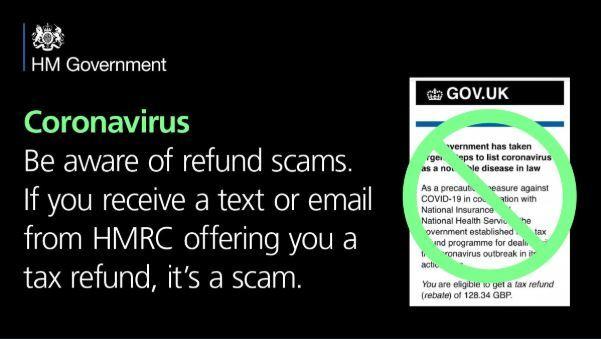
Don’t become a victim – criminals are using the Covid-19 pandemic to scam the public!
COVID-19, the disease caused by the novel coronavirus, is now officially a worldwide pandemic. Criminals all over the world are using this crisis to scam the public, targeting vulnerable groups as they seek to capitalise on the pandemic. Action Fraud reported a 400% increase in coronavirus-related fraud in March 2020.
The Police and other government bodies are working together to spread information about these scams and ensure the public is vigilant against fraud.
The Crown Prosecution Service has shared the following advice:
- · Stop: Taking a moment to stop and think before parting with your money or information could keep you safe.
- · Challenge: Could it be fake? It’s ok to reject, refuse or ignore any requests. Only criminals will try to rush or panic you.
- · Protect: Contact your bank immediately if you think you’ve fallen for a scam and report it to Action Fraud
Below you can find a list of the most common scams. Please note that the list is by no means exhaustive, and criminals can find other ways of targeting individuals so always be vigilant:
1) Universal credit/government grant scams: are taking place in person and on social media; Residents are being approached by ‘companies or individuals’ offering ‘specialist advice’ or ‘lawyers advice’ and are asking for a fee to do, e.g. Universal Credit application. Please bear in mind that the UC application is free of charge!
2) Virus Testing: are selling COVID-19 tests online or in person.
Virus testing kits are only offered by the NHS in the UK.
3) Vaccines/Cures: There is currently no vaccine or cure for COVID-19.
4) Counterfit Products: There has been a surge in overpriced or fake goods to protect yourself from the coronavirus. These include antibacterial gels, masks etc.
5) Shopping/Medication Delivery: Criminals targeting vulnerable people on their doorstep and offering to do their shopping or deliver medicine.
6) Cleaning Services: Offering cleansing services to prevent the spread of the virus.
7) Phishing emails/text messages: Beware of messages tricking you into opening malicious attachements which could lead do fraudsters gaining access to personal information. The following e-mails have been identified by Aciton Fraud:
- Fraudsters purporting to be from a research group that mimic the Centre for Disease Control and Prevention (CDC) and World Health Organisation (WHO). They claim to provide the victim with a list of active infections in their area but to access this information the victim needs to either: click on a link which redirects them to a credential-stealing page; or make a donation of support in the form of a payment into a Bitcoin account.
- Fraudsters providing articles about the virus outbreak with a link to a fake company website where victims are encouraged to click to subscribe to a daily newsletter for further updates.
- Fraudsters sending investment scheme and trading advice encouraging people to take advantage of the coronavirus downturn.
- Fraudsters purporting to be from HMRC offering a tax refund and directing victims to a fake website to harvest their personal and financial details. The emails often display the HMRC logo, making it look reasonably genuine and convincing.
If you or someone you know has been a targeted by a scam, you should report it to Action Fraud online at www.actionfraud.police.uk/ or by calling 0300 123 2040. For advice and information on how to check if something might be a scam, visit: citizensadvice.org.uk
The examples of the HMRC phishing emails can be found at gov.uk.
If you require language support to report a scam, please contact the PBIC team on 01234 328 100 or e-mail at info@pbic.org.uk Monday to Friday between 9.30 am to 3 pm. PBIC offers free support!
If you need advice URGENTLY, we have launched an additional PBIC helpline 01234 331817.
The helpline will be open on:
Monday 9.30 am – 3 pm
Thursday 9.30 am – 3 pm
Friday 9.30 am – 3 pm